I remember excitedly sitting down in the theater to watch The 13th Warrior when it came out in 1999. As a medievalist I get pumped about most big-budget quasi-medieval films (and, yes, a lot of low-budget ones, too!), but this one had me more excited than usual.
First, it was directed by John McTiernan. Despite some occasional career blunders, he’s helmed both Die Hard (1988) and The Hunt for Red October (1990). That’s good for something.
Second, the movie was based on Michael Crichton’s Eaters of the Dead, a novel that was, in turn, based on both the great Old English epic Beowulf and the very real account of Ahmad Ibn Fadlan’s embassy to the Volga Bulgars on behalf of the Caliph of Baghdad in the year 922. As a Muslim outsider, Ibn Fadlan recorded much of what he saw with what was, at times, a kind of horrified fascination. The resulting book (and thus the other source Crichton used) is called the Risala, and it’s most famous for Ibn Fadlan’s eyewitness account of the ship-burial of a king among the Rus—a band of Vikings who plied their trade along the Volga River and (fun fact alert!) ultimately gave their name to Russia.
As a conceit, Crichton’s plot is a fun one. He accurately relates Ibn Fadlan’s real account up to that famous burial, but then he smoothly shifts to fiction: the new leader of the Rus is a man named Buliwyf, and he immediately learns of a dark and ancient threat menacing a tribe to the north. An oracle suggests that thirteen men be sent in response, and that the thirteenth man cannot be a Viking. Ibn Fadlan goes along with the party, and an adventure begins—one that’s a rewriting of the story of the hero Beowulf (Buliwyf, of course). For the record, this conceit is both terrifically clever and utterly impossible. To cite but one reason, our sole surviving copy of Beowulf was written at the end of the tenth century, which totally works for Crichton’s re-imagining—but the story it relates takes place some five centuries earlier, which doesn’t work at all.
Regardless, like I said, I went into the theater pretty excited.

Alas, the opening shot nearly wrecked my excitement. It’s Vikings on a longship in a storm …laughing.
Not chuckling in the sort-of gallows humor way that I could see a real person doing—”Haha, welp, we’re all clearly gonna die now”—but full-on and deep-throated belly laughter in a way that no one but fake Vikings in movies ever do.
On a ship. In a storm.
The only man not engaged in uproarious merriment aboard the vessel is a miserable-looking Antonio (“How do you say? Ah, yes”) Banderas, who sits in the drenching rain, playing the role of a dejected puppy dog an Arab tag-along to this band of merry fellows who have apparently just heard the greatest joke ever told. In voiceover, he introduces himself as Ibn Fadlan and notes that “Things were not always thus.”
And then, remarkably, the movie gets worse. We’re thrust into a confusing flashback sequence relating how Ibn Fadlan was once a court poet in Baghdad who fell in love with another man’s wife—which is a cool story for the few seconds of screen time it requires in order to serve as an overly complex reason for Ibn Fadlan to be sent away to serve as an ambassador to the land of the distant Volga Bulgars.
And here we get a helpful map overlay for the geographically disinclined.
Wait…does that map place the city of Baghdad between the Caspian Sea and the Black Sea, somewhere around modern-day Vladikavkaz in Russia? Sure does! That’s around 700 miles north of its actual location in Iraq.
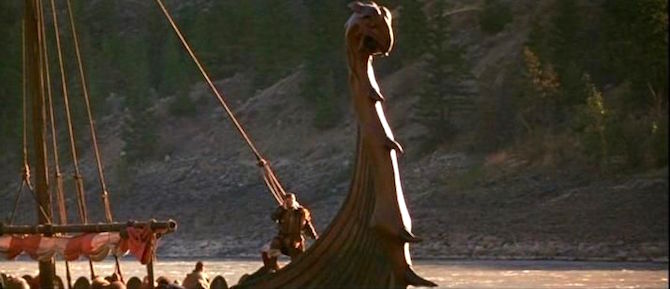
Turns out it isn’t the audience who needs a damn map.
And then, even before this map of alt-fact Earth is done fading out, Ibn Fadlan’s voiceover informs us that he next met some dangerous Tartars.
Wait…the Tartars were marauders of the 13th century, not the 10th. So, um …
Ignoring my attempts to get this timeline to make sense, the movie presses on, and Ibn Fadlan’s delegation is indeed beset by dangerous Tartars—which is cool for the few seconds of screen time it requires in order to serve as an overly complex reason for Ibn Fadlan to run toward a river where he and his company see a longship.
This leads Ibn Fadlan and his fellows to worry about whether the newly discovered Norsemen will kill them—which is a cool story for the few seconds of screen time it requires in order to have the delegation go just a bit further along the river to where they run into an encampment of the Volga Bulgars…
…which is where the damn movie needed to start, because literally the only thing that we need to know about all of the preceding is that Ibn Fadlan is a Muslim ambassador to these folks.
So, if you want to watch this movie—and you should, because I sorta guiltily love it—you’ve got to skip the first 3 minutes and 45 seconds of it.
Not a mistake there, by the way: they packed all that nonsense into less than four minutes of screen time. I’d say that’s a record for hurting my poor medievalist sensibilities, but I’m still recovering from my ill-fated drinking game with quite possibly the worst Viking movie ever made.
Part of the reason you should nevertheless watch The 13th Warrior, though, is that there are moments like the next sequence, which is one of my favorites in the film because it shows awareness of a very real and important element that most movies ignore: language.
Ibn Fadlan speaks Arabic, you see. The fine Viking fellows he now meets in the main tent of the encampment—a tent filled (sigh) with seemingly constant uproarious laughter and drinking through beards—don’t speak that language at all. (What they are actually speaking, in fact, is Norwegian, which is a descendant of Old Norse tongues and convenient for the filmmakers because it was the native language of many of the actors.)
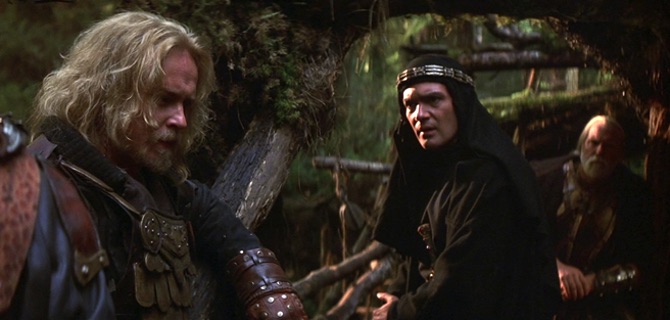
Luckily for him, Ibn Fadlan has a companion with him named Melchisidek (played by the wonderful Omar Sharif) who begins trying some of the different languages he knows on various bearded fellows in the crowd. One of them hears him speaking Greek and so leads them to a Viking named Herger the Joyous. This character will proceed to totally and utterly steal this and every other scene he is in, and I hereby declare that the actor, Dennis Storhøi, is sadly underused by Hollywood.
Anyway, Melchisidek is trying to find their king so that he can present Ibn Fadlan to him, and their first conversation goes like this:
Ibn Fadlan (in English, here passing for the protagonist’s Arabic): Try Greek.
Melchisidek (in Greek): Hegemona hymeteron? Basilea hymeteron?
Herger the Joyous: ::half-drunk stare::
Melchisidek (in Latin): Uestrum legem?
Herger (in Latin, after a beat): Noster Rex! Tabernaculo.
Melchisidek (in English): He says their king is out there in that tent.
Herger (in Latin): Non loquetur.
Melchisidek (in English): He says the king will not speak with us.
Herger (in Latin): Non loquetur, quia mortuus est!
Melchisidek (in English): Apparently, the king will not speak to us, because he is dead. This is his funeral.
Buliwyf (in Norwegian): Herger, hvem er den fremmede?
Herger (in Norwegian): Det er en Araber fra Baghdad.
No Common Tongue bullpucky here, folks! It’s even got natural errors. Melchisidek’s Greek, “ἡγεμόνα ὑμέτερον, βασιλέα ὑμέτερον,” by which he is apparently trying to say “Your chief? Your king?”, is incorrect grammar (this is not his native tongue, you see). And his Latin “Uestrum legem” doesn’t mean “Your king’ but instead “Your law,” an easy mistake for “Your law-giver.” This is the reason it takes Herger a moment to understand what he’s asking, and the reason he corrects Melchisidek with correct Latin (“Noster Rex”) when he does.
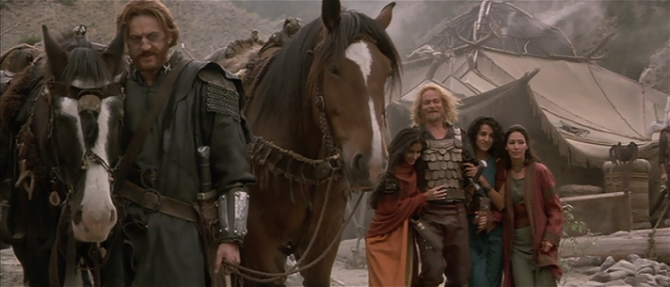
This kind of thing goes on until Ibn Fadlan heads off as the titular thirteenth warrior with Buliwyf and his Viking pals. Oh man. I love it.
But wait! There’s more! Finding himself now without his translator Melchisidek, Ibn Fadlan next spends night after night watching and listening to his companions talking (and, of course, laughing) around the campfire until he learns enough to respond to one of their jokes at his expense.
Study abroad language immersion for the win, kids!
This sequence, too, is marvelous. Through cut scenes we watch as the men around the campfire go from all-Norwegian to mostly-Norwegian-but-a-little-English—McTiernan uses repeat cuts, zooming in on their mouths to show Ibn Fadlan’s focus—to mostly-English to this moment when Ibn Fadlan reveals his new language abilities:
Skeld the Superstitious: Blow-hards the both of you. She probably was some smoke-colored camp-girl. (points at Ibn Fadlan) Looks like that one’s mother!
Ibn Fadlan (speaking slowly in English, now passing for the protagonist’s newfound Norwegian): My mother …
Skeld: ::stares at him in shock::
Ibn Fadlan: … was a pure woman … from a noble family. And I, at least, know who my father is, you pig-eating son of a whore.
Oh maaaaaan. With the pork-prod at the end, too. Boom. Medieval mic drop. (Watch it here.)
I know some reviewers gripe about this sequence, complaining that you can’t learn a language so quickly. To that, I say that no, apparently you can’t. But some folks over the course of a week of immersion really can pick up more than enough to get by. Plus, you know, at least the filmmakers are actually trying here. They’re paying attention to the problem of language. And I love it.
As it happens, McTiernan also paid attention to these details in The Hunt for Red October, too. Get past Sean Connery’s Scottish Russian and you’ll see a great scene in which a KGB officer starts to question Connery’s sub-captain—both of them speaking in Russian with subtitles. At one point the officer picks up a Bible that the captain has been reading, and he starts to read a verse from the Book of Revelation. The camera zooms in on his mouth as he speaks Russian … right up until he hits the word “Armageddon.” Then, without skipping a beat, the officer completes the verse in English as the camera zooms back out. Voilà, our Russians will now speak English (at least until the final scenes where they’re joined by actual English speakers), and we have a movie that’s easier to follow. That the filmmakers flipped it on “Armageddon,” the word common to English and Russian and the threatening theme of the Cold War itself, is just perfection.
But back to the 5th/10th/13th century.
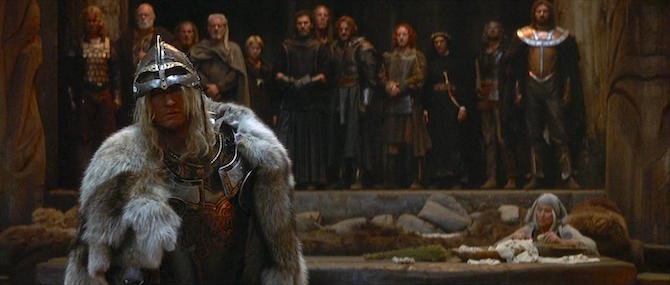
No. Scratch that. It’s also the 16th century since one of the Viking warriors is wearing a Spanish conquistador helmet called a morion and another has a peascod breastplate. Aaaaaand there’s also a Viking in what looks like an 18th-century walking kilt. One of them has a Roman gladiator helm that’s iffy but at least sorta vaguely theoretically possible, and the whole horse-size thing is completely flipped around since the Arabs had the big horses and the Vikings had the wee ones, but, you know, I’ve got to set my historical brain aside at some point and just watch the film.
So, anyway, back to the 5th/10th/13th/16th/18th century.
Looking past all the historical mistakes (and the logistical insanity of that horse herd at the end), The 13th Warrior is actually a fun and well-done film. Even if the amazing language sequences weren’t there, the filmmakers still made a movie with some great visual moments, a good score (two of them, as it turns out), some tight battle sequences, a solid plot, and some truly enjoyable characters. The protagonist in particular undergoes a remarkable journey from a self-important man to one who, the moment before a dire battle, can earnestly make this prayer:
Ibn Fadlan: Merciful Father, I have squandered my days with plans of many things. This was not among them. But at this moment, I beg only to live the next few minutes well. For all we ought to have thought, and have not thought; all we ought to have said, and have not said; all we ought to have done, and have not done; I pray thee, God, for forgiveness.
Matching such moments, I think, is acting that is superb for this kind of film. Storhøi’s Herger, as I said, steals every scene he’s in. And Banderas, leaving aside the fact that his accent is Spanish, makes for a great outsider in Ibn Fadlan. One final sequence is (I think) perfect, as the men join in a traditional Norse prayer—with Ibn Fadlan now perfectly woven in:
Buliwyf: Lo, there do I see my father. Lo, there do I see…
Herger the Joyous: My mother, and my sisters, and my brothers.
Buliwyf: Lo, there do I see…
Herger: The line of my people…
Edgtho the Silent: Back to the beginning.
Weath the Musician: Lo, they do call to me.
Ibn Fadlan: They bid me take my place among them.
Buliwyf: In the halls of Valhalla…
Ibn Fadlan: Where the brave…
Herger: May live…
Ibn Fadlan: …Forever.
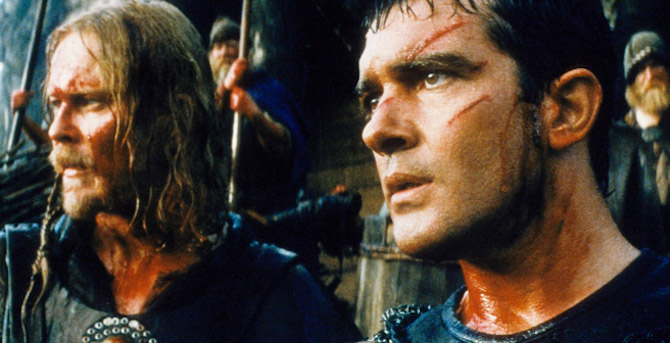
That’s good stuff, made even better by the fact that Ibn Fadlan, in the grander meta-fictional conceit of this, will be the man to write Buliwyf’s story and set off the chain of tales that will leave him immortalized in Beowulf.
All in all, The 13th Warrior is definitely one of my go-to “medieval” films despite the many historical issues. Don’t be surprised to see, when I get around to finishing it, that this film ranks very high on my list of the best film adaptations of Beowulf.
 Michael Livingston is a Professor of Medieval Literature at The Citadel who has written extensively both on medieval history and on modern medievalism. His historical fantasy series set in Ancient Rome, The Shards of Heaven and its sequel The Gates of Hell, is available from Tor Books.
Michael Livingston is a Professor of Medieval Literature at The Citadel who has written extensively both on medieval history and on modern medievalism. His historical fantasy series set in Ancient Rome, The Shards of Heaven and its sequel The Gates of Hell, is available from Tor Books.










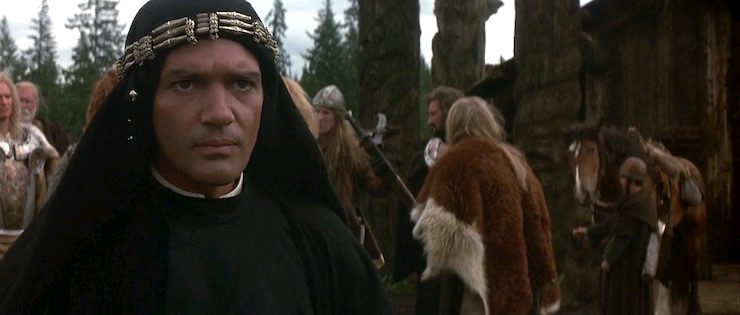
I absolutely love this movie and have since it came out (I was 17 at the time). I can watch it now and see that it may not be a “great” movie, but I don’t care. I love it. One thing that sticks out to me is that the filmmakers resist the urge to make Ibn the hero. Several times, he survives fights by pure luck and even at the end, were he plays his part in driving off the villains, he is secondary to the Viking characters, specifically Buliwyf.
I also completely agree that Storhøi is a treasure in this movie. His character is perfect in that he provides comic relief, but is still 100% badass (see the challenge scene).
Regarding Ibn’s great insult, “son of a whore” is probably the curse I use most often. Also used effectively in “Serenity”, but still better here.
A very underrated movie, IMO
This movie is made of awesome, luckily I’m no historian so I don’t get jarred so much!
Wait – did I say “luckily”? I meant, of course, “unfortunately”…
Thanks for a great article!
This is a movie that, for all that I like it, has serious problems that a Director’s Cut could fix. Bring us a Director’s Cut!
Don’t forget the fabulous moment when Buliwyf realizes that Ibn Fadlan is literate, and knows the power of it. A man would be wealthy indeed if someone would draw the story of his life. ( YEAH!!!!!)
I haven’t seen it in a while, but I remember enjoying it a lot, anachronistic costuming aside. Wasn’t there a scene in which the Norsemen, with their big powerful steeds, are all, “Oh, look at the foreigner’s cute widdle horsie-worsie, isn’t he just a cyooot widdle horsie-worsie? Does the widdle foreigner need a widdle horsie-worsie for his widdle bottom?” or words to that effect, and then Ibn Fadlan demonstrates that he can ride his pedigreed Arab without giving any visible signals to the horse, and also horsie-worsie can jump better than any of their big clodhoppers?
I did not know the Crichton’s book when I first saw this movie although I knew the Ibn Fadlan record very well and was absolutely thrilled when I started to recognise it as I wathced.
Vladimir Kulich as Buliwyf also gave a great performance. His character speaks seldom, but he still manages to show enormous charisma and presence of a natural born leader with every gesture. He is totally believable as someone who can lead you willingly on a suicidal mission.
I remember that many of my friends were surprised with Arab encountering Vikings and thought it was so fake. I had great pleasure saying that it was actually one of the few historically accurate details in the film :-)
As others have agreed, I love this movie despite all the incongruity, POSSIBLY because I was 14 when it came out and all up on Antonio, but ALSO because it is just a lot of fun and my fave balance of history/action/comedic relief. Give me 13th Warrior and The Mummy over gritty 2010s blockbusters any day.
I also love when he’s offered mead and he says he cannot drink anything made from the “fermentation of grape nor of wheat” then Herger the Joyous laughs telling him it’s made from honey.
Also responsible for a line in a games manual that made me laugh out loud. I think it was the PC game Icewind Dale, and all the description for scimitar read was “curved sword. Useful if a band of 12 Vikings need help.” Or some such.
I love this movie… It’s been a guilty pleasure since the first time I saw it.
However… I call shenanigans on grinding a Viking Long/Broadsword into a perfectly balanced, single edged scimitar… especially with a sandstone(?) grinding wheel.
That said, the line about “When you get killed, can I have it for my daughter” is fracking hilarious.
Can someone please let John McTiernan direct a new movie.
I real favorite of mine as well. The story is a bit absurd but the acting and McTiernan’s masterful handling of language more than makes up for it.
I remember the book as being one of the few of Michael Crichton’s that was actually enjoyable. Perhaps it was over the top enough and he wasn’t taking it as over seriously as his conspiracy of the week books? Anyway, I also remember the reviews of this movie being not just bad but “Plan 9” level bad but after this perhaps I’ll see if I can track down a copy.
Loved this movie when I first saw it, and still love it today. Yes, it has it’s set of problems as stated in this article, what with the anachronistic costuming, inaccurate maps, etc. But it was FUN….also, I was 13 at the time it came out (heh) so I was the perfect audience. I did not realise it was also a retelling of Beowulf, which is a fun tidbit, and I for one can’t wait to watch it again, even with the awkward first 3-4 minutes
This is still one of my favorite movies. We watch it on a fairly regular basis. The language barrier was genius and a nearly perfect scene, I agree. Sadly, I don’t know enough Norse/Viking history to comment on costuming, but i always wondered where they put all those giant draft horses on the ship. Also, I wondered about the cannibals all riding what look like purebred Fjord ponies. In fact, if you look closely, you can see some groomed manes in the herd. That said, though, this is a gem of a movie full of quotable dialogue and genuine Moments!
Fun movie.
But “best film adaptations of Beowulf” has to be a short — I mean really short — list, right? Besides this one, are there good films in other languages I don’t know about?
Unless, reasonably, you want to say that all adventure stories with a hero and real-but-metaphorical monsters and tests of character are adaptations of Beowulf, which they kind of are.
I always enjoyed this movie. I think what I liked most about it were,the tactics. The characters where veteran warriors and acted like it. They did not fight as individuals, but as a unit. Each member had strengths and the utilized them to support the group. All vital elements for fighting a superior force.
ive loved this movie since the first time I saw it. Heck I used to think I was one of the the only ones who had even seen it much less loved it (till I found it had a pretty good rep on the movie/tv message board I frequent.
Banderas did a good job as well as the guy who played the Buliwyf character and I agree that the Hergert the Joyous character really stood out – the Shireld/Axe fight scene was truly memorable as was the final battle and its end.
just an enjoyable movie.
What a fantastic review. The 13th Warrior has been one of my favorites since it came out, and the part that really hooked me was the language. The sequence where Fadlan learns their language is truly amazing. Let me quibble with you for a moment about the opening scene. Perhaps it was a little overdone, but I viewed it as drawing a comparison between men who were at home on the sea joyfully meeting the challenges of a heavy squall to a landlubber who was unknown with the vagaries of the sea. I challenge you the author, an obvious landlubber, to spend a few weeks on a U.S. Navy Destroyer in the middle of a storm. You will find the sailors behaving just as those Vikings were in The 13th Warrior. Thank you for a great article.
Awesome article as always, thank you, Michael!
And I agree with everybody here commenting before me. I absolutely love this movie and have watched it at least a dozen times (a figure bound to grow). The prayer cited in the end of the article gives me chills every time I hear or read it. Totally loved the fact that language barrier was taken into account, and all the scenes and moments mentioned in the article and in the comments, and how Herger calls Ibn Fadlan “little brother” and … well, everything about it. Now thinking about it, I think I just might put my old VHS tape on again when I get home …
@20,
My take on the ship storm was similar to yours. These are men who know they are going to die and are going to do it their own way. That gives a certain amount of freedom to laugh in the face of death. Black humor. Also, its worth remembering that the Norse religion was basically apocalyptic in its construction. You die in battle, you go to Valhalla, where you fight every day until Ragnarok comes and everyone (except a few) dies fighting the giants.
Oh, many. My wife and I love this movie. We watch it at least once a year. Now I think we’ll need to haul this out this weekend…Dennis Storhøi stole this movie from Antonio Banderas, oh so effortlessly.
Can someone please let John McTiernan direct a new movie.
I think the problem is partly that his last two movies (Rollerball and Basic) were both critical and financial failures. And then he was caught up in legal proceedings from 2006 until 2013, when he began serving a one-year prison sentence for perjury and lying to the FBI during a criminal investigation. He’s been free since early 2014, and recently directed a short promo for the video game Tom Clancy’s Ghost Recon: Wildlands, so maybe he’ll be able to direct movies again sometime soon…
Love this movie and I also read Eaters of the Dead. Herger is a great character.
Spoiler alerts:
My favorite scenes are Buliwyf, fascinated by the Arabs having a written language, has Ibn write in the sand.. Then days later Buliwyf, tests Ibn’s honesty by writing the exact same phrase having after only seen it the one time, and has Ibn read it to see if its the same.
Also the one of my favorite scenes of any movie, the duel between Herger and the big brute. It’s seemly over a slight of honor but was really strategically planned to remove some opposition while simultaneously thwarting any more opposition by instilling a sense of dangerous unpredictability about him and his band of warriors and making them seem more than they may be.
To this day, me and brother will, in our best Antonio Banderas voice, say “I listened!”
Great review! I too loved the movie, despite some of it’s faults. Some of the alleged faults can be disregarded altogether. E.g. Ibn Fadlan’s backstory gives us some insight into his character- he is not just some blank slate Arab noble and ambassador. We could pretend they said “Magyars”, not “Tartars”. For the morion helmet, breastplates, etc., there is nothing to be done, unfortunately…
@austin 26
:D I regularly answer people with my best Antonio Banderas tone impression “It is … possible”
This movie was given such roundly bad reviews when it first came out, I neglected to see it then and hadn’t thought about it much since. Your review gives me pause. I never knew it had anything to do with Beowulf, and being as my family descends from the Rus (an ethnic group currently reclaiming their heritage in a big way: see http://www.c-rs.org/) I really feel like I should look it up. At the very least it’s got a great cast and sounds like a lot of fun, inaccuracies notwithstanding.
Next analysis, Ladyhawke…
To the couple of people thinking about checking it out after avoiding it due to bad reviews, SEE IT NOW! Even if you decide it’s not a great film, I bet you still have fun but if you’re on this website, I also bet you will love it.
I still don’t understand why this movie had such poor reviews; it’s great fun to watch. I’ve seen it online and on dvd at least three times. The performances were credible; good action scenes, Viking ambiance was convincing; Banderas did a great job as the protagonist (kudos to his worthy horse). I’ll have to rewatch it again soon.
It’s worth noting that the memorable ‘language-learning’ scene in the movie does not happen in the book. Herger remains the translator for Ibn Fadlan throughout. Which cannot help but lend a certain amount of clunkiness to the narrative.
The 13th Warrior is, therefore, one of those movies that’s actually much better than the book it’s based on.
When this movie came out, I commented that it seemed to be based on incorrect answers to a HS World History course.
Many people naïve in materials science think of steel as a homogeneous substance like cheese. But a steel sword, particularly an older one, and most particularly a Viking one, has structure. And so does an Arab sword. Grinding won’t get you from one to the other.
(apologies to dairy experts if it turns out a block of cheese does have a real internal structure to it. I mean they think steel is as homogeneous as a very homogeneous thing)
Don’t start me on Peter Jackson’s glass-shard-shaped “shards” of Narsil, or the visual of it being beaten into a new sword as if imping a bird’s feather.
I love this movie. Don’t care about inaccuracies because it’s fiction and never claimed to be historically accurate in any way. And his retort speaking their language was the main scene that made me love this movie.
The intro is fine. They didn’t “pack” it into less than four minutes. They gave you enough to have a basis for why the heck this guy is out being an ambassador to people he has disdain for and no wish to be around. If they didn’t include it, you’d have the same “complain about everything” people whining that we’re given no context, or asking why he doesn’t already speak Norwegian if he’s their ambassador, or asking why he hates his job, etc etc.
So pick one. A short intro with just enough context, or a long intro that isn’t an intro anymore and has now become an origin story. Can’t have it both ways.
This movie is flawed, broken, and a mess. I loved every single minute of it! It was awesome!
I actually don’t mind the morion at all. I was reading it (and the kilt) as shorthand for “these Vikings are from a widespread culture with local variations and some have served in various local armies” rather than an attempt to suggest someone from the 10th century would wear a helmet from the 16th. It’s very recognisable as “a Spanish helmet” so it’s a way to quickly and visually say “this one was in Spain” while Tony Curran’s plaid and facial tattoo says “this Viking is from Ireland or Scotland probably, the Vikings were there too you guys”.
I also loved this movie from the first viewing and am glad to have seen it in the theater-there’s something about the spectacle on the big screen that just isn’t obtainable on a small. Scheduling it for a rewatch, after seven samurai. Now there’s a double feature!
“So, anyway, back to the 5th/10th/13th/16th/18th century.”
Hahahaha! Thanks for a very funny and enjoyable read. I too love this film, despite its many, many flaws. If you’re a fan of Skyrim, the actor who plays Buliwyf in 13th warrior voices the rogue nord jarl Ulfric Stormcloak beautifully.
I agree with @36. The short intro was necessary (and I feel it adds genuine “flavour”, that the world is a bigger place than what the movie focuses on), otherwise there’d be unending posts about “why would an arab be with the vikings? it’d be much more likely to be a pict/egyptian/native american/something-else”
Other than that, when I watched it, I did not take the “language learning” scene to be “a week”. It was just some vague “indeterminate, but not very short, length of time”, i.e. over many nights of quietly sitting and observing their conversations, he worked out their language. Considering he was a poet (i.e. “gifted with language”?) it seemed plausible he could work out the language, through immersion, fairly quickly – I know I couldn’t :-P, but I couldn’t join up with 12 vikings and help defeat a dragon of cannibals either!
It is one of my favorite movies. I have watched it a least a dozen times and anytime I am channel surfing and I run across it I stop and watch it again. I know on a basic level it is not a great movie but there is something about the story, the music, the characters, the acting, and so many great lines, that all together it really sucks me in.
One note as @11 mentioned, the only time the film causes me to “drop out” of the story is when Ibn turns a straight sword into a scimitar, that is just sooooo wrong.
Thanks for the post. I enjoyed the movie too, mostly because of the (to me) encounter between an effete, cultured Arab from the center of wealthiest, most scientifically advanced, and most powerful culture in the world, and a bunch of dirty, illiterate Rus who are nonetheless superb fighters. It does present some gender norms unskeptically: “And so I became a man.” (He was already a man. A poet, true, but a man.)
The book makes more of ibn Fadlan’s travels north, which the movie skips over probably out of necessity, though it does answer a few of your criticisms. As you probably know, ibn Fadlan is sent as emissary to the Volga Bulgars, who are not at all marauders. The book has more humor, mostly in ibn Fadlan’s understated horror at the Rus’ barbaric ways. It does make less of the language difficulties, Crichton makes ibn Fadlan a Latin-speaker. And the fight scenes are not at all dramatized, as befitting Fadlan’s style and role as reporter and chronicler, not a novelist. But the book has the villagers already know where the Wendol Mother lives (why didn’t they all smoke her out long ago?)
Excellent movie – has the front spot in my video collection!
I just saw this movie for the first time. I agree with everything in the article above, but there’s one criticism that wasn’t made. Namely, the action choreography is just terrible. The duel, the battles…really clumsy stuff that made maximum use of stuttering slow-mo to try to hide the awkwardness of it all. Pretty disappointing from the director of Die Hard, but I’m guessing the director may not be directly responsible for those details.
One thing I really loved was the fact that it took the perspective of the Arab protagonist, and managed to make the Vikings seem exotic and strange through his eyes. It made perfect sense even though it’s something you don’t often see.
Loved your article. This is one of my favourite films and one of the main reasons is how they treat the language issue and also the cultural barriers between people.
PS. Just one small correction:
Melchisidek doesn’t ask to Herger “Uestrum legem?” as you corrected in the article. He says “Uestrum regem?”, which is perfectly correct in latin. The strong r is very clear to me (and I’m romance language speaker and also I studied latin at high school)
I’m most definitely one of those for whom this movie is far, far too beloved to be called a Guilty Pleasure; this isn’t History, it’s MYTHOLOGY begad! (One would also like to note that Mr Vladimir Kulich is my favourite screen Beowulf to date – he not only looks like a man who could rip a troll’s arm off with his bare hands, he looks like a man you could trust with a Kingdom too*).
*Which, much as I love Mr Ray Winston’s work, HIS Beowulf most certainly does not. The two adaptations are locked head-to-head, dead even when it comes to the race for ‘Most Awesome Soundtrack’ award (The only thing I love more than orchestral bombast is MANLY Orchestral Bombast).
Also, I’m fairly sure the True Reason we haven’t seen the fellow who played Herger the Joyful in many films since is because he was actually Fandral the Dashing (having briefly escaped the pages of Marvel Comics) making a little money by essentially being himself in front of a camera! (-;
What a great review! This is a fun and excellent movie – I’ve seen it many times. I think one of the *very best* moments is the first time we see the Wendol for the first time, coming toward the farm; carrying torches and moving through mist and trees, making them the ‘fire wyrm’ – it was an incredible, spooky, and wonderful effect.
All in all, really just a great movie.
There are roughly 12 quotes in the movie which pretty much sum up what one should learn before leaving home, namely, life’s lessons. Period.
I love that film.